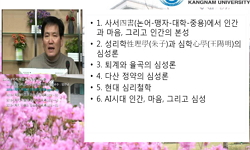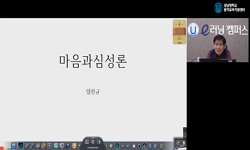It is a very meaningful work that studies the ideal state of human being in both Neo-Confucianism and Zen of Buddhism within the comparative perspective. On one hand, Neo-Confucianism ultimately aims at a state of being a Man(;being a moral saint) thr...
http://chineseinput.net/에서 pinyin(병음)방식으로 중국어를 변환할 수 있습니다.
변환된 중국어를 복사하여 사용하시면 됩니다.
- 中文 을 입력하시려면 zhongwen을 입력하시고 space를누르시면됩니다.
- 北京 을 입력하시려면 beijing을 입력하시고 space를 누르시면 됩니다.
성불(成佛)과 위성(爲聖) = A Comparative study on 'To be a Man'(Confucianism) and 'To be a Buddhist Saint'(Buddhism)
한글로보기https://www.riss.kr/link?id=A104010229
-
저자
유흔우 (동국대학교 철학과)
- 발행기관
- 학술지명
- 권호사항
-
발행연도
2008
-
작성언어
Korean
-
주제어
Contemporary New-Humanism ; human nature ; Buddha-nature ; fate ; subjectivity ; oneness of Heaven and Human ; 신인문학 ; 인성 ; 人性 ; 불성 ; 佛性 ; 운명 ; 주체성 ; 천인합일
-
자료형태
학술저널
-
수록면
46-98(53쪽)
-
KCI 피인용횟수
4
- DOI식별코드
- 제공처
- 소장기관
-
0
상세조회 -
0
다운로드
부가정보
다국어 초록 (Multilingual Abstract)
It is a very meaningful work that studies the ideal state of human being in both Neo-Confucianism and Zen of Buddhism within the comparative perspective. On one hand,
Neo-Confucianism ultimately aims at a state of being a Man(;being a moral saint) through the cultivation and the continuos learning of himself. On the other hand, Zen's thoughts in China aims at the presentative completeness of being a Buddhist saint(;being a state of Buddha himself). The idea of this presentative completeness in being couldn't be ever found in
originally existing Buddhism of India so far. This great idea could have been established by the result from the influence of Confucianism on Buddhism, when it came inside into China and
the conventional thoughts in China.
There is a big difference between a state of being a Man as the ideal image and a state of being Buddhist saint, in that Confucianism never goes beyond the correlational tie of sociality
while Buddhism carries on the religious dimension of its isolated nature in the first place. This feature would be brought up by the different opinions on the nature of human being each other.
That is to say, Zen's thoughts rest on a firm basic idea of the commonness in all things of the universe similar to Taoism, meanwhile Confucianism pays intensive attention on human being's own peculiarity. Therefore, Zen in Buddhism pursues the discussion about human nature within the possible sphere while Neo-Confucianism regards human nature as something that can
be firmly determined with value sets. According to these different viewpoints, it is absolutely natural that there are differential ways of realization and its results in human nature.
This paper aims at the introspection in Neo-Confucianism in order to figure out its possible access towards Contemporary New-Humanism;(Neo-humane studies). For this general purpose, it compares the concepts of oneness in between Heaven;‘Tian’ (天) and Human;‘Ren’(人) with the several perspectives in Zen's thoughts. In addition to this procedure, carefully negating the general existing viewpoint on that Confucius's thoughts and Mencius's had been originally taken as the idea of oneness in between ‘Tian’(天) and ‘Ren’(人), this paper begins to look closely into the key point of Confucian as the tensive correlation of the subjective free will with Tianming(天命) that indicates the objective necessity and the inevitable fate as well as fortune.
This effort in this paper makes it possible to put an emphasis on the essential feature of Contemporary New-Humanism;(Neo-humane studies) in that there are human being's free will and subjectivity.
국문 초록 (Abstract)
신인문학을 정초하는데서 신유학과 선불교의 이상 인격을 비교하는 것은 큰 의미를 갖는다. 신유학은 수양과 공부를 통해 성인(聖人)이 되는 것을 철학의 궁극적 목적으로 한다. 반면 중국 ...
신인문학을 정초하는데서 신유학과 선불교의 이상 인격을 비교하는 것은 큰 의미를 갖는다. 신유학은 수양과 공부를 통해 성인(聖人)이 되는 것을 철학의 궁극적 목적으로 한다. 반면 중국 선불교는 부처(佛)를 현성(現成)하는 것을 목적으로 한다. 부처의 현성을 목적으로 하는 것은 본래 인도불교에서는 찾아볼 수 없는 사상으로 불교가 중국에 들어와 유학(儒學)의 영향을 크게 받은 결과로 형성된 사상이라 할 수 있다.
유학의 이상인격인 성인(聖人)과 불교의 부처(佛) 사이에 놓여 있는 가장 큰 차이는, 유학의 성인은 끝까지 사회성 차원을 떠나지 않는 반면 부처는 ‘고독성’이라는 종교 차원이 우선이라는 점에 있다. 이는 인간의 본질에 관한 서로 다른 견해에서 비롯된 것이라고 할 수 있는바, 중국 선불교는 노장(老莊)의 도가와 마찬가지로 만물의 공성(共性)에 기초하지만 유학은 인간의 고유성을 주목한다는 차이가 있다. 그래서 선불교는 인간의 본질·본성을 가능성 차원에서 논의하지만, 신유학은 가치적으로 확정된 어떤 것으로 말하게 된다. 이에 따라 인간 본질의 실현 방법이나 그 결과가 다르게 되는 것은 자연스러운 일이라 할 수 있다.
이 글은 신유학에서 신인문학의 가능성을 탐색해 보는 것을 목적으로 기획된 것이다. 이를 위해 신유학의 천인합일론을 전제로 중국 선불교와 여러 관점을 비교하였다. 또 공자와 맹자의 철학이 본래부터 천인합일적 이었다는 일반적인 생각을 부정하고, 운명 내지 객관필연적 추세를 의미하는 천명(天命)과 인간의 주체 자유 역량을 대비시키는 것에 공자·맹자 철학의 핵심이 있다는 점을 살펴보는 것으로 시작하였다. 신인문학에서 가장 중요한 요소가 인간의 주체와 자유에 있다는 점을 강조하기 위한 것이었다.
참고문헌 (Reference)
1 "六祖檀經"
2 "論語"
3 "老子"
4 勞思光, "중국철학사(송명편)" 탐구당 1987
5 周敦頤, "通書"
6 宗密, "華嚴原人論, In 禪源諸詮集都序 卷二"
7 "華嚴五十要問答 卷下"
8 法藏, "華嚴一乘敎義分齊章 卷二"
9 "莊子"
10 周易, "繫辭傳"
1 "六祖檀經"
2 "論語"
3 "老子"
4 勞思光, "중국철학사(송명편)" 탐구당 1987
5 周敦頤, "通書"
6 宗密, "華嚴原人論, In 禪源諸詮集都序 卷二"
7 "華嚴五十要問答 卷下"
8 法藏, "華嚴一乘敎義分齊章 卷二"
9 "莊子"
10 周易, "繫辭傳"
11 陳來, "朱熹哲學硏究" 1993
12 "朱子語類 권1·5·6·104·126"
13 "景德傳燈錄"
14 德淸, "憨山老人夢遊集 卷四"
15 傳燈大師, "性善惡論"
16 "張子全書"
17 "宛陵錄"
18 馮達文, "宋明新儒學略論" 廣東人民出版社 1997
19 "孟子"
20 "大般涅槃經集解, In 德王品"
21 吉藏, "大乘玄論 卷三"
22 慧思, "大乘止觀法門 卷二"
23 周敦頤, "周敦頤集 卷三"
24 "名僧傳抄說處"
25 "佛說大般泥洹經"
26 "中庸"
동일학술지(권/호) 다른 논문
-
라이프니츠와 칸트 : 인식의 조건으로서 ‘지각’과 ‘통각’의 차이에 대한 고찰
- 동국대학교 동서사상연구소
- 한병준
- 2008
-
- 동국대학교 동서사상연구소
- 김영진
- 2008
-
칸트의 물자체 개념 - 칸트의 형이상학 구상과 초월에 대한 입장에 관하여 -
- 동국대학교 동서사상연구소
- 이재헌
- 2008
-
Hegel und Heidegger, oder : die Wende vom Denken des Denkens zum Seinsdenken
- 동국대학교 동서사상연구소
- Richard Wisser
- 2008
분석정보
인용정보 인용지수 설명보기
학술지 이력
| 연월일 | 이력구분 | 이력상세 | 등재구분 |
|---|---|---|---|
| 2028 | 평가예정 | 재인증평가 신청대상 (재인증) | |
| 2022-01-01 | 평가 | 등재학술지 유지 (재인증) |  |
| 2019-01-01 | 평가 | 등재학술지 유지 (계속평가) |  |
| 2016-01-01 | 평가 | 등재학술지 선정 (계속평가) |  |
| 2014-01-01 | 평가 | 등재후보학술지 선정 (신규평가) |  |
| 2013-12-01 | 평가 | 등재후보 탈락 (기타) | |
| 2012-01-01 | 평가 | 등재후보 1차 FAIL (등재후보1차) |  |
| 2011-01-01 | 평가 | 등재후보학술지 유지 (등재후보1차) |  |
| 2009-01-01 | 평가 | 등재후보학술지 선정 (신규평가) |  |
학술지 인용정보
| 기준연도 | WOS-KCI 통합IF(2년) | KCIF(2년) | KCIF(3년) |
|---|---|---|---|
| 2016 | 0.38 | 0.38 | 0.3 |
| KCIF(4년) | KCIF(5년) | 중심성지수(3년) | 즉시성지수 |
| 0.28 | 0.23 | 0.863 | 0.13 |




 RISS
RISS KISS
KISS







